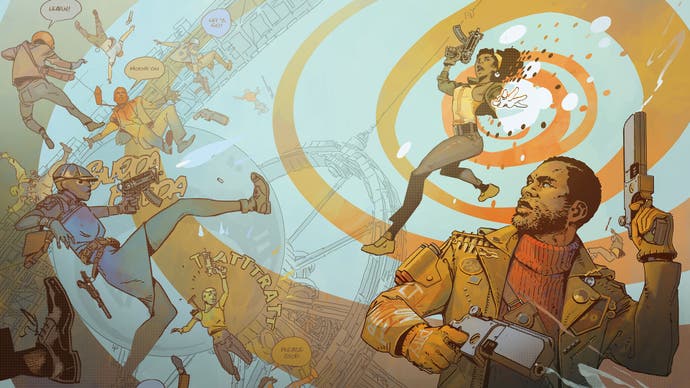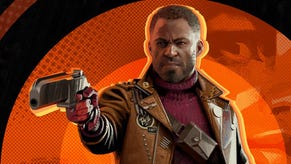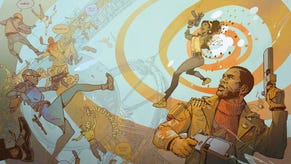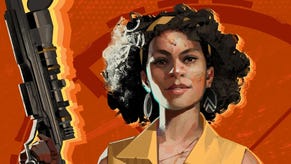A round-up of the talks from GAConf Europe 2023
A look at the current state of accessibility in games.
The Games Accessibility Conference returned to London on the 24th and 25th of April, with a program of talks on accessibility at the Coin Street Neighbourhood Centre. The conference talks were also live streamed through Zoom thanks to the conference's hybrid setup.
"In a time where many events are returning to in-person only," conference co-director, Tara Voelker told me, "we are embracing hybrid to truly support the disability community.
"I think events are getting more accessible overall, but I like to think we keep trying to set the bar and act as an example for other events to follow."
It's a setup that means speakers and attendees can attend GAConf on their own terms.
"We get to hear from excellent speakers and learn about their expertise from around the world, which we may have not been able to get if we required physical attendance," Voelker said. "We want the content of our conference to be available to anyone interested, so supporting hybrid has been a no-brainer. We've seen a positive impact of the hybrid event with larger attendance with these barriers for attendance removed."
This was supported by a surprisingly robust COVID consideration, when most events are ignoring the ongoing pandemic. In-person attendees were required to have proof of vaccination and a negative COVID test. "We know that this doesn't fully remove the risk, but for those who could be impacted by COVID, such as immunocompromised attendees, we felt a responsibility to do what we could to offer to reduce the risk of infection."
It all makes for an open and accessible conference, with room to take breaks, to catch up on YouTube, and for multiple perspectives on the subject of accessibility. This meant many, including me, who wouldn't be able to attend an in-person event, were still able to reap the benefits of the insight on show at GAConf Europe 2023.
"We don't want anyone to feel excluded from the GAConf community," Voelker said.
The conference started in earnest at 10am on the 24th, beginning as usual with a news update from conference co-director, Ian Hamilton, covering advances in hardware, resources, and more since the last conference. Of particular interest was seeing collated information on how publications are beginning to embrace accessibility as part of their regular coverage, from IGN starting a new accessibility column, Access Designed, to outlets beginning to include accessibility related screenshots in reviews.
After this, Jamie Knight spoke about how a world built for able-bodied people can exacerbate disability, and how video games can both erect and dismantle those barriers.
This was followed by a talk on the deaf-blind experience by Dr Arthur Theil, and how deaf-blind gamers are often left out of wider accessibility discussions that tend to focus on single, well-defined disability rather than the greater spectrum.
Lucile Dolbeau then led a panel discussion on how accessibility is approached and addressed in quality assurance.
This was followed by a series of short talks after lunch.
First, Matthew Tomkinson spoke about the representation in Just Dance - for which the game won a GAConf award in January - and how representation of disabled players can be as powerful as accessibility. Next, Topher Winward gave a talk on blind accessibility and how Rare has implemented it in Sea of Thieves (including plenty of questionable puns, if that's your jam). The talk also touched on how Rare has developed a culture of accessibility over the years. Then Ben Wilson gave a personal tour through developing games with, and to portray, dyspraxia, touching on how games can give players the impression of living with dyspraxia through the power of interactive media. The final short talk of the day came from Antonio Martínez, founder of the Game Accessibility Nexus, who spoke about gaming with progressive disability.
After another short break, Christopher McGerr of TT Games presented the story of developing better accessibility for LEGO Star Wars: The Skywalker Saga, with a particular focus on how the game can be played without audio. Day one came to a close with a talk from Mila Pavlin on how to plan the accessibility process across the production and development of a game.
Day two kicked off with Conor Bradley on Soft Leaf Studio's dedication to a ground-up philosophy of accessibility, through partnership with disabled players from start to finish. This was illustrated in the studio's upcoming game, Stories of Blossom, built with a focus on accessibility. This was a marker that Soft Leaf is among the studios leading the way on incorporating accessibility into the entire development process, but also another reminder that accessibility is always better the earlier it's considered.
Jozef Kulik followed with a breakdown of his study on disabled engagement and experience, demonstrating the value of investigating how disabled players experience games and how inaccessibility affects that experience. After which, Harriet Frayling and Chris Goodyear of Many Cats Studios spoke about accessibility consultancy: what it is, how consultants can be found, and particularly the pathways to becoming an accessibility consultant. They had practical advice on how to do it and what to expect.
The conference's second and final panel got underway before lunch, this time on chronic pain and how video games can empower those with chronic illness in a world otherwise not built for them. The panel was led by Stacey Jenkins of Ubisoft Paris and included RollWithRu, Arevya, and Kolo Jones.
If anything highlights just how valuable GAconf is, the way this panel cut through to relatable and moving stories about disability with a frank conversation on the realities of chronic illness in the gaming space is it. The cuttingly honest way the panel spoke about disability and how gaming can empower them in a world that too often does the opposite wasn't just the highlight of the conference but was also emblematic of what makes GAConf so special - outside its frequent references to baked goods, that is.
After the break came more short talks, with Barrie Ellis leading a tribute to Colin McDonnnel, followed by Andy Robertson talking about how accessibility has influenced the Family Gaming Database. Next, Brandon Blacoe spoke about creating accessible hardware with a look at the modular kits he's producing. The program was rounded off by Yoann Bazoge discussing how accessibility was retrofitted into Deathloop.
The final session of the conference started with the unveiling of Project BlackKat by Cari Watterton and SightlessKombat, a prototype experience with a focus on creating stealth and combat that is fully accessible to blind and visually impaired players. After this, having presented the entire conference, Tara Voelker finished up by talking about how inappropriate some of the ways we measure accessibility success are for the goals we're trying to achieve, highlighting some of the pitfalls developers can fall into when trying to examine how well titles manage accessibility.
It was another successful and accessible event from GAConf, one marked by a pointedly personal theme across many of the talks. All the talks are available on the IDGA-GA SIG YouTube channel and website, and are linked throughout. The conference moves to Seattle in Autumn, with more information available on GAConf's website.










